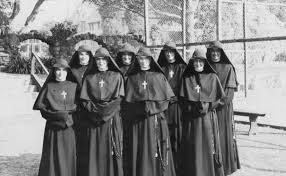Mags Gargan visits a counselling service in Dublin’s North inner city for its 20th anniversary celebration
An oasis is defined as fertile ground in a desert or something that provides refuge, relief and is preserved from surrounding unpleasantness. There is no better description for the Oasis Centre in Seville Place in Dublin’s North inner city. Nestled in St Laurence O’Toole parish, a community struggling with many challenges – including the recent gangland shooting of Martin O’Rourke – walking through the doors of the old red brick convent owned by the Religious Sisters of Charity is like stepping into another world.
Away from the Garda checkpoints, the broken bottles and the teens hanging on the street corner, you enter a calm, bright and welcoming environment.
The Irish Catholic is here to attend the 20th anniversary celebration of the opening of the counselling service here, which is a continuation of the work of the sisters. “It would fit in with the vision of Mary Aikenhead, [founder of the congregation] who said all our services are about being able to give to the poor what the rich can afford to buy,” says Sr Geraldine Byrne RSC, founder and Executive Director.
The services offered by the Oasis Centre are low cost or no cost, depending on what clients can afford. There are three projects: Oasis one-to-one counselling; Deora counselling, which specialises in crisis intervention and the mindfulness clinic which offers mindfulness based stress reduction training.
The counsellors deal with a range of issues such as anxiety, addiction, bereavement, relationship problems, abuse, depression and suicidal ideation.
Deora receives funding from the drugs task force and has four part-time counsellors, an administrator and co-ordinator. All the other services are donation-based and the other counsellors work on a voluntary basis.
Accredited
“We have a number of trained counsellors who are accredited and others who are working towards accreditation,” says Sr Geraldine. “Overall there are 34 counsellors and we are open 9am-9pm, four days a week, and until 4pm on Friday.
“The centre’s greatest asset is its people. Every day our staff provide innovative support to the local community in the North inner city and beyond. Their attitude means that even seemingly unlikely objectives are possible and by taking small steps every day they are transforming people’s lives.”
Sr Geraldine and Sr Mary Benton, the Chairperson of the Board, are the only two sisters still living in the old convent and represent the continuing relationship with the community after over 130 years.
The Religious Sisters of Charity first came to Seville Place in 1882. They responded to the needs of the community, providing soup and bread to over 1,000 families. They offered a Penny Dinners service from 1909 right up to 1988 and they trained young
girls for employment, while offering a hostel for girls from the countryside attending training.
As the age profile of the sisters increased in the 1980s and 90s, the congregation began to discuss the future of the building. “They decided to withdraw and were giving the property to Dublin City Council for social housing and for whatever reason it didn’t happen,” says Sr Geraldine. “I had just returned from England after completing a counselling course and the idea came to set up a counselling service in 1996. I was on my own for the first year or so with one client but with word of mouth it grew.
“A Sacred Heart Sister joined me and then another counsellor, and gradually it built up and other people came and different colleges wanted to send trainees here because of the wealth of experience they could get here.”
Mission statement
The centre’s mission statement says it aims “to foster an environment that is person-centred and creates an atmosphere of trust, respect, encouragement and integration”. That focus on being person-centred is what sets it apart from other counselling services, according to counsellor Annemarie Murray.
“I have been here since 2009. When I first got my placement here from college, I thought it was Heaven sent and I knew this was the place I wanted to work. You find a lot of centres are run like businesses as opposed to being people centred. Whereas here it was the people first. It has a lovely atmosphere, the staff are great and as a team are all very supportive of each other. I am very proud to be part of it.”
“It is a real privilege to work in a place that is so respectful of people who come in no matter where people come from or whatever walk of life,” says counsellor Martina O’Beirne. “The clients who come here come first and that goes from management right down to counsellors and volunteers.”
The Oasis Centre saw nearly 8,000 clients last year alone and has supported nearly 100,000 since the centre opened in 1996. However, Sr Geraldine says “you can’t quantify it”. “The whole idea of counselling is that it helps the person, but also those in contact with them such as their family. It has a ripple effect.”
For the anniversary celebration some of the seven counselling rooms housed an exhibition showing the history of the building and the sisters’ work here. In a ceremony in the small chapel a number of guests paid tribute to the Oasis Centre, including local TD Maureen O’Sullivan who is a member of the board. Two ex-clients also gave a testimony on how the centre provided them with vital support during a time of crisis and despair.
Asking for help was a major challenge for Pat, but he says that it saved his life. Pat was struggling with grief when in the space of a year and a half he lost his brother, father and sister. He fell into a deep depression and was considering suicide.
Pat was familiar with the Oasis Centre from doing some painting and decorating work there and decided to contact Sr Geraldine. “I rang Geraldine and she said come over straight away. I had a talk with her and she put me in touch with a counsellor. Walking out the gate, it was such a relief. I knew that people were looking after me,” he said. “It’s been a year since I started coming here and I feel great in myself – a totally different person. I would be lost without the place.”
Intervention
“Some of our work involves suicide intervention and people come really to say they have had enough and can’t take anymore,” says Paula Garrett, co-ordinator of the Deora project. “So it is to be with them exactly where they are, to allow them to feel understood in the hope that they can gain some perspective and find a way to stay living.”
Magdalena suffered a severe spinal injury in a car crash. She was dealing with a lot of pain and ended up losing her job and becoming homeless when she could no longer pay her rent. “When you are in total despair you cannot see any solution. The only thing you can dream about is to disappear,” she says.
“One day I decided to die. I took painkillers mixed with sleeping tablets and alcohol, and I slit my wrists. But I survived and I woke up in the middle of the night in hospital. Now it was clear to me that someone did not want me to leave because his plans were different. From that time I started looking for help.”
Magdalena sought help from the Crosscare homeless agency operated by the Dublin archdiocese and they referred her to the Oasis Centre. “Every time I came out of the centre I started to feel more peaceful and finally I started to see light at the end of the tunnel. It makes me emotional every time I think of how much kindness I received from the Oasis Centre,” she says.
“Counselling in a nutshell is being with the person, journeying with them side-by-side,” says Paula. “What this convent was originally set up to do was to take care of people and that is what is still happening today.”


 Mags Gargan
Mags Gargan
